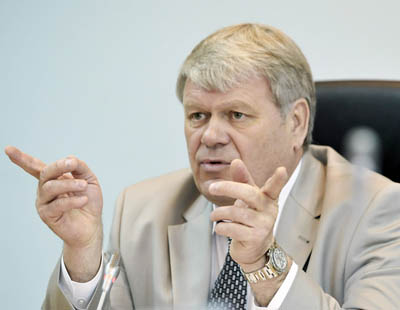
Why Russia’s Governors Are Speaking Out About Ethnic Problems
Publication: Eurasia Daily Monitor Volume: 10 Issue: 13
By:

Last Thursday, facing a deteriorating ethnic situation in his own krai, Stavropol Governor Valery Zerenkov said that it was time to end “the policy of minimizing” such developments or ignoring them altogether. The authorities must start to report “objectively” about them, and “on the basis of [such reporting] to work out an effective system for the defense of peace and concord in the North Caucasus” (vestikavkaza.ru/news/Na-Stavropole-perestanut-zamalchivat-problemy-natsionalnoy-politiki.html).
But dismissing Zerenkov’s remarks as nothing more than an effort to force his subordinates to report more accurately on ethnic issues, or alternatively as one intended to boost his own support by playing up an issue that has enflamed Stavropol (on conditions there, see bigcaucasus.com/events/analysis/22-01-2013/82169-peredery-0/), would be a mistake. In fact, they are part of a broader trend of increasing openness about ethnic issues by the heads of federal subjects, the unintended consequence of Vladimir Putin’s push to make regional leaders responsible for maintaining ethnic peace on their territories and one that is likely to have some unwelcome consequences for both the regional leaders and Moscow itself.
Last fall, during the discussions of Russia’s new nationality strategy document, which Putin confirmed in December, the Kremlin argued that in today’s Russian Federation, regional leaders must hold primary responsibility for providing early warning about inter-ethnic problems on their territories and then coming up with solutions to them. At the time, many regional leaders argued that the problems they faced were of Moscow’s making rather than theirs (ati-times.tatar-inform.ru/news/society/682/). But Putin, who has been a master in shifting blame, insisted that the regional and republic leaders must bear responsibility for such issues, pointedly adding that their own fates depended upon it.
Zarenkov’s comments have attracted the most attention in Moscow because of Stavropol’s proximity to the North Caucasus and due to it being the site of the Olympiad planned for Sochi in 2014. But they are far from the most dramatic among this new outpouring of remarkably blunt statements by regional leaders. This prize for that at least so far certainly belongs to officials in Karelia.
At the end of December, at a meeting the contents of which have only been reported in the last few days, Karelian Economic Development Minister Valentin Chmil said that the situation in his republic is so dire economically and ethnically that he is “ready to engage in prostitution” if that is what it takes to pay for what needs to be done. Karelia, he continued, “except for its natural resources, has nothing attractive. And not a single normal investor under normal conditions is going to come there.” Consequently, he said, Petrazavodsk officials have to “travel to Moscow” and “kiss” whomever and wherever is necessary in order to try to secure money to maintain the economy of places like Kondopoga—the site of ethnic conflicts in the past (forum-msk.org/material/news/9745785.html).
Not surprisingly, this leak has sparked a serious scandal, but it has done something else as well. It has prompted some officials, including Aleksandr Stepanov, vice speaker of the Karelian parliament, to point out the obvious: “Chmel spoke the truth” but “not all of it and not as it should have been described.” Moreover, “Karelia is far from being alone in such circumstances.” Like other regions, “the life of the majority of its population” has been rendered almost completely dependent on exports of raw materials. That was Moscow’s choice, but now, “Karelia, like all of Russia, needs to develop according to completely different social-economic principles.”
Over the last several weeks, the leaders of many regions and republics in the Russian Federation have become increasingly open in their discussion of ethnic and other problems. But as interesting as this trend and the specific comments may be, far more important are three more general consequences now looming over Russia.
First, coverage of leadership statements about these problems is certain to encourage at least some ethnic (and other) activists to press their agendas, thereby at least potentially in the short term exacerbating rather than reducing ethnic tensions in the Russian Federation. Such people are likely to ask why their leaders are not speaking out when others, like Stavropol’s Zerenkov and Karelia’s Chmil, have.
Second, as such discussions proceed, the regional heads are likely to find themselves confronted with a Hobson’s choice: If they do not discuss these issues and problems arise, Moscow will remove them, but if they do, they may face a loss of authority at home and new challengers to their positions both within their regional bureaucracies and populations.
And third, as it has already been pointed out by Stepanov in Karelia, most of the problems the regions of the Russian Federation now face are not of their own making but reflect Moscow’s decisions. That, in turn, could lead them to try to come together and confront the center, exactly the reverse of what Putin and his supporters hoped for when they said the regional heads must bear responsibility.




